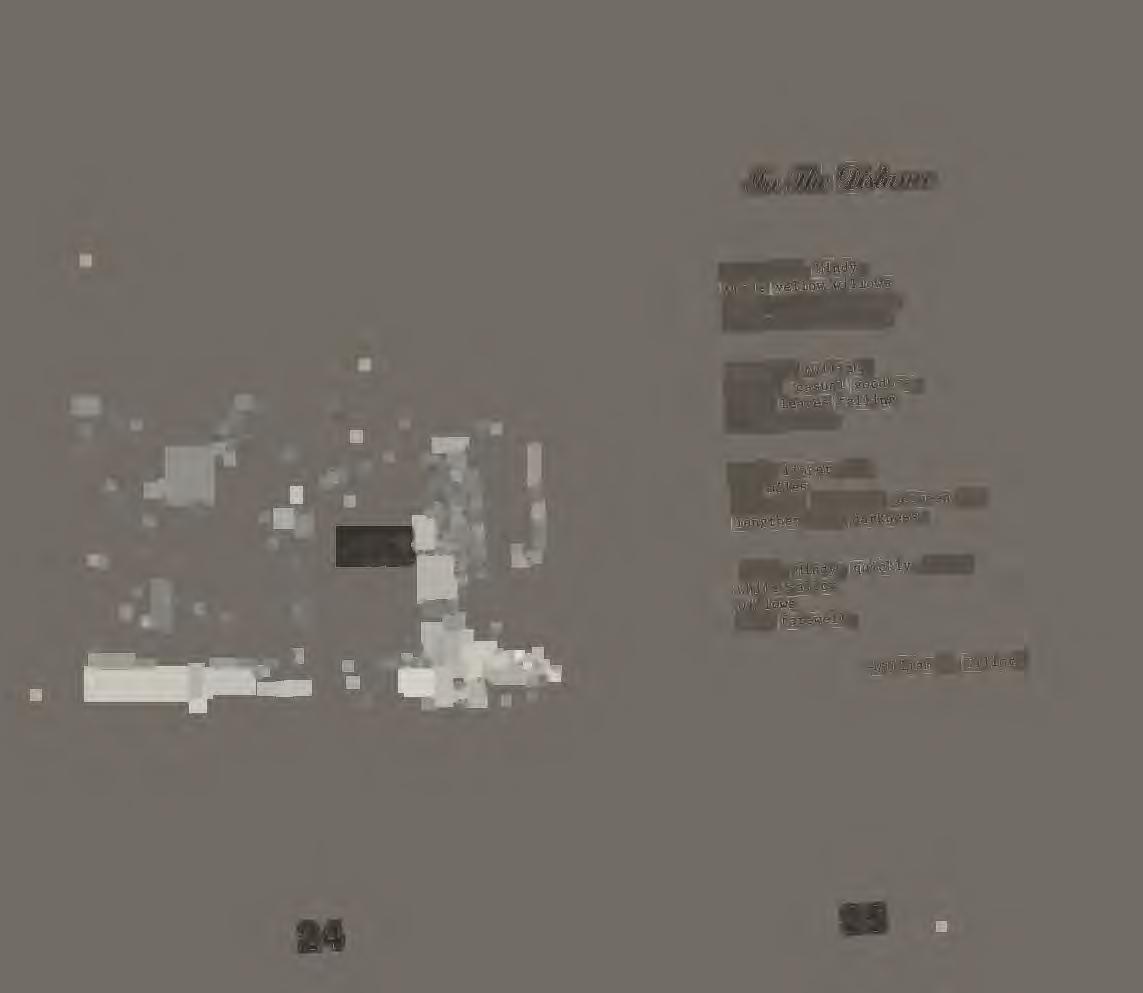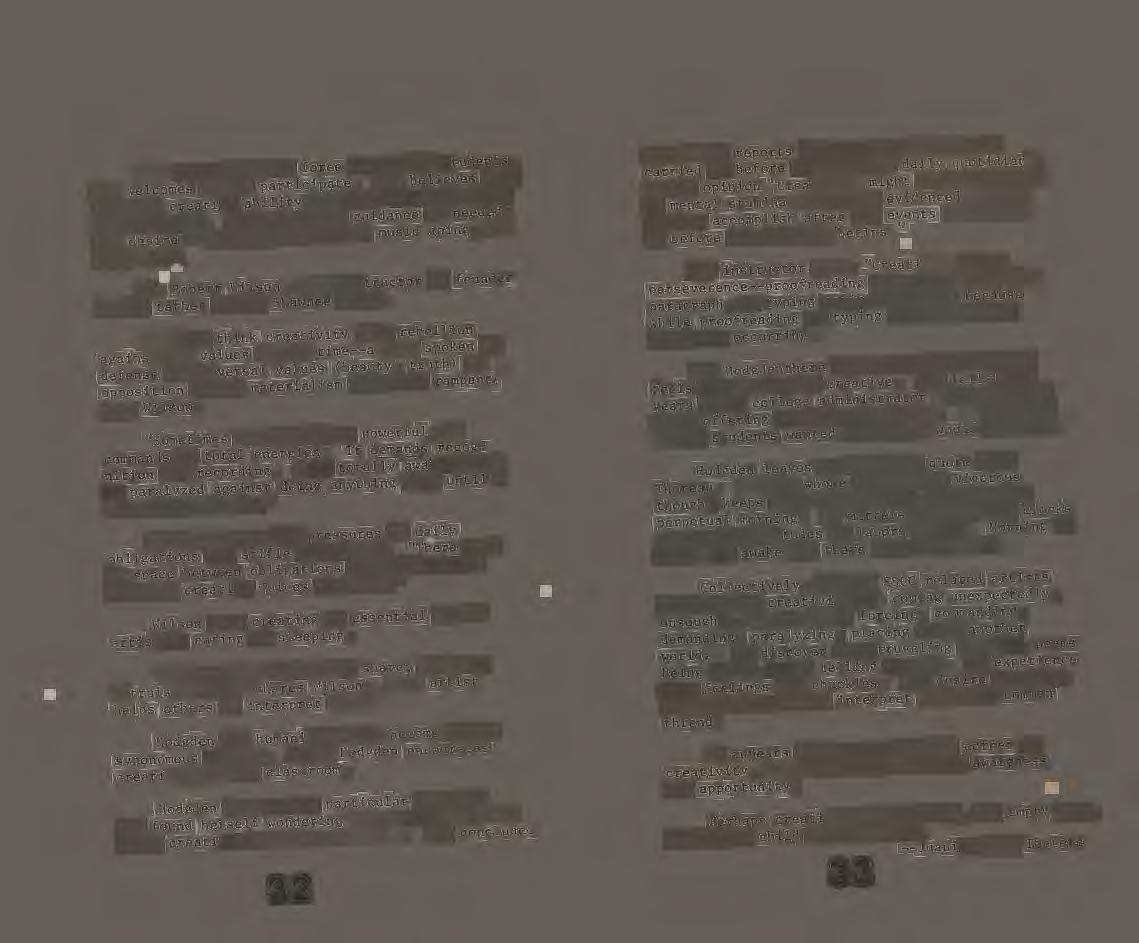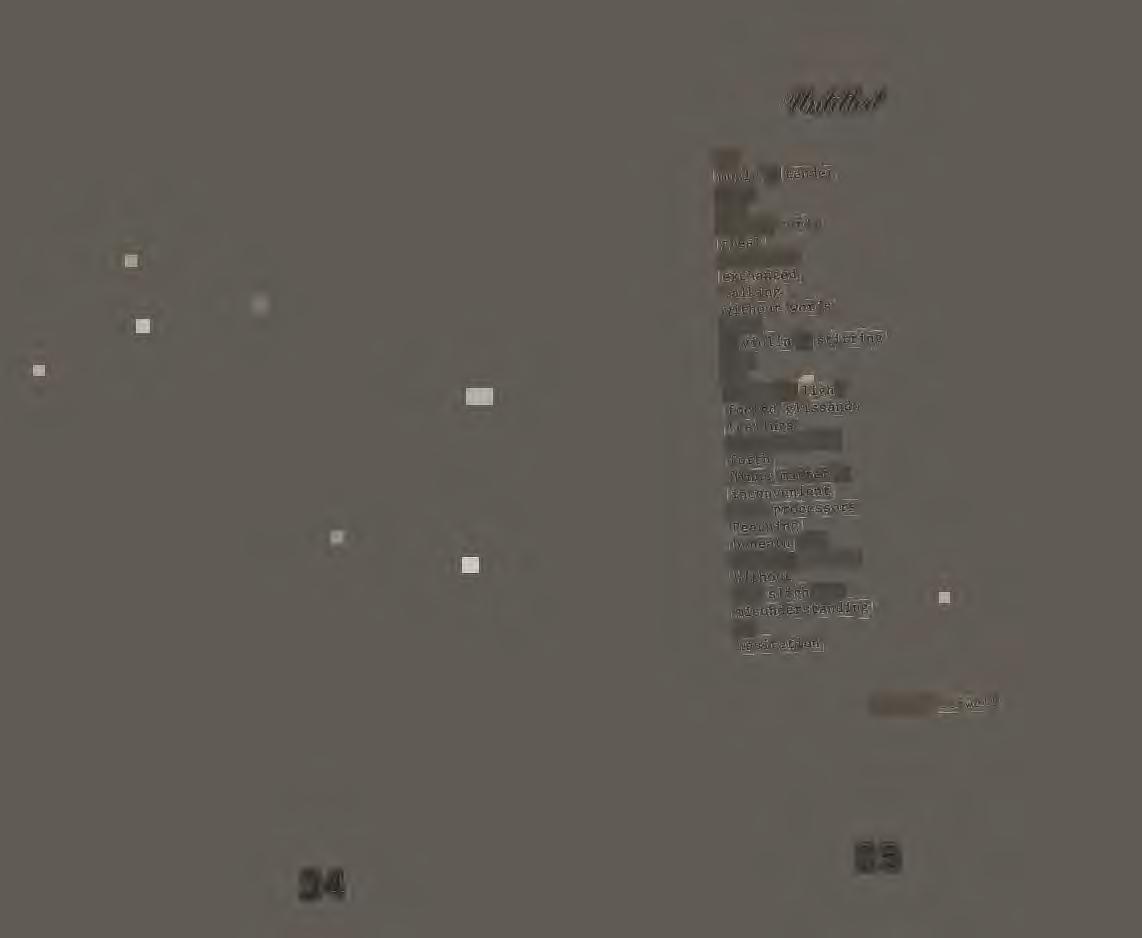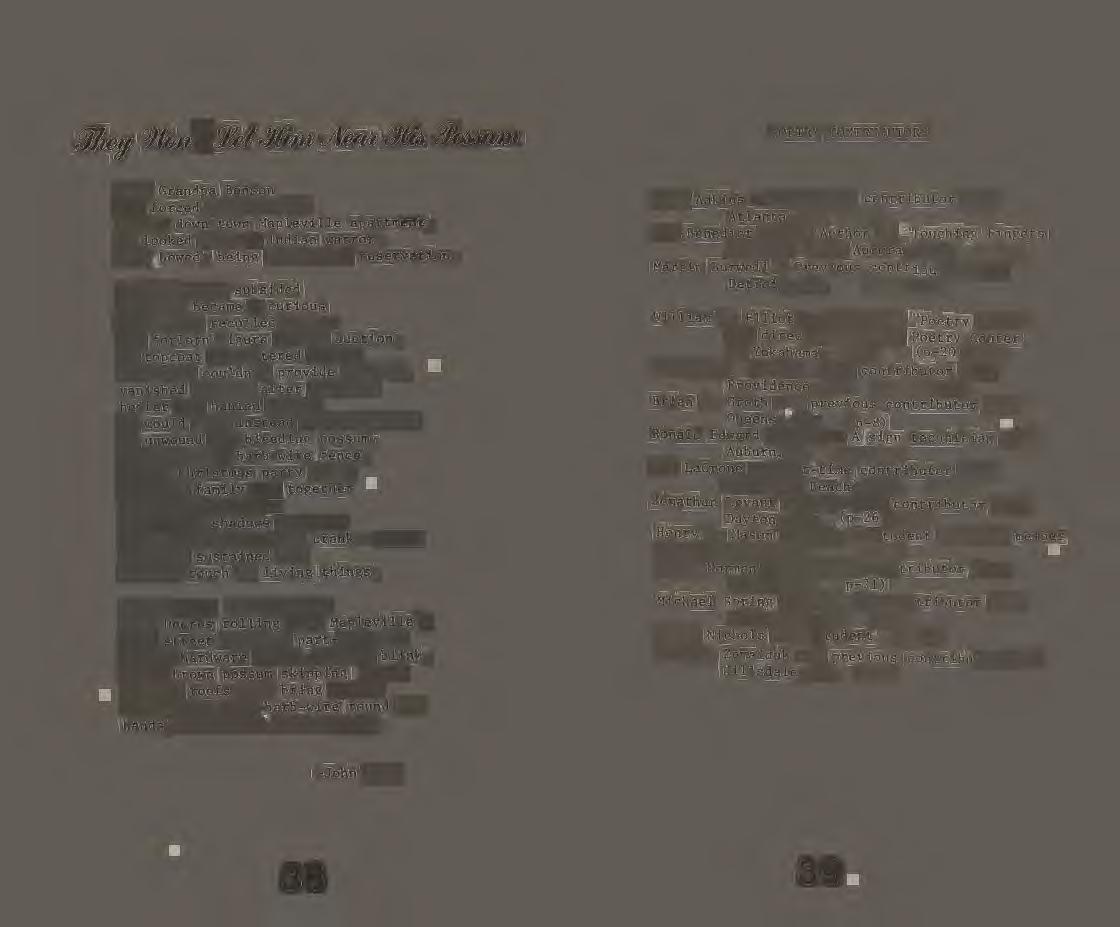
The Shawnee Silhouette the editorial staff at Portsmouth, Ohio. Subscrl $2.00 a cop y or $5. 0 a published during all Submissions are invite words maximum), poe

Charles Tamela
Teresa L
Assistant Poe
Henry C ••
Darre ll
Fred Lester,
Printe d b All Rights rever upon publicatio t Cover Photo
Second
uarterly by ersity in ailabl e for issues will be Qua rters. (800
CONTRIBUTIONS ISSUE SEVEN
2 Guest Editorial/ 4 Mountain Path/ 6 Lights/ 6 Still Myself/ 7 A Dedication to All The Flowers/ 7 Saturday Nights/ 8 Paranoia/ 8 The Galapagos/ 9 Manslaughter/ 10 Road to Julesburg/ 14 Next Door/ 16 A Letter From Peru/ 17 On The Types of Poets/ 20 Joanne Stiller/ 21 April First/ 21 A Tender Circle/ 22 Other Things/ 23 Cement Lullaby/ 25 In The Distance/ 26 Ariel's Ankles J 27 Rough/ 28 In Search of Creativity/ 35 Untitled/ 36 Lonliness Is/ 38 They Won't Let Him Near His Possum/

Reminder: The Shawnee Hills Poetry Workshop, an annual event at Greenbo Lake State Park in Greenup, Kentucky, i9 scheduled for April 25-27, 1987.
April 25- 8:00 p.m. "Moonshining and the Ballads That Attended Them."
April 26- 9: 30 a.m. Writing Workshop 1:00 p.m. Editing Workshop 8:00 p.m. Public Reading
April 27- 9:00 a.m. Wrap-up

Writing is at once complex and simple. Strait-forward and yet filled with hidden meanings, sometimes even unknown to the writer. Good writing can stir us to anger, action, even open revolt. It may be correctly said that the first volleys of the American Revoluti on were fired, not at Lexington and Concord, but in print shops of Boston and Phi1adelphi a, and the anguished voices of black rican slaves echoed through this Nation 's conscience in the works of abolitionists, long before the shots rang out in Charleston.
The writer's task is always to find the precise word or phrase. In this quest the journalist, the poet and the novelist all share a common goal. They share another goal as well-to seek out truth. A journalist may do this by exposing fraud, the poet by exposing his soul. The problem for all writers, however, as Ernest Hemingway observed, remains the same. "It is

always to write truly," said Hemingway, "And having found what is true, to project it in such a way that it becomes a part of the experience of the person who reads it."
As journalists we are constrained by what we observe, as poets by who we are. To be successful, we must work always to see more clearly and to grow within ourselves.
The best writing touches the reader, causes us to see ourselves and others in new ways. I hope the readers of this volume will be touched by what follows.
-Richard E. Whitt
Richard Whitt is the Special Projects reporter for the Louisville, Ky Courier-Journal. His credits include: Pulitzer Prize-1978, Champion Media Award I98I, and Hancock Award 1983.

Softly bumming its tune the cool breeze reaches me treating my senses ta the fragrance of cypress and pine.
A red-tailed hawk soars caressing the wind in an effortless flight above gray temples of granite.
I climb upward, barefoot on rock higher than I've ever climbed before higher than ost dare to go --even the wolf howls on a lower peak.
Several clouds have tasted skin as I walked through their bodies clinging like a dream to the mountain side.
I bring only myself
I inherit peace from life and become part of n atu~e. Roots and soil hold my foot in the prism of the mountain forest with snow fresh springs dancing toward the valley to quench my thirst.
Birds chatter and whistle in the wind rustled leaves bringing music to my soul and the silence reflects its wisdom in a calm lake.

Without a glance back I step forward into a rising 1 d C OU
With one foot in tomorrow I leave yesterday in the shadows of my memory.
-Michael Spring
The lights are on They flick off! We are blind Lost in the darkness Uncomfortable with the peace.
-Ted Lacrone

I
am a freak! Foolishly I think The shower will change me But only water Swirls down the drain.
-Ted Lacrone
f!lldt«tina W!
Who says men were never sensitive? Once, when young, Their feelings grew like antlers, prominent and wild.
But such ornaments are ripe to exposure; the smiles of twenty women are worse than moulting.
Soon, the antlers tumble to the forest floor, buried under necessity; turning to fertilizer, to rise, unexpected, in form of stubborn green seedlings, or poems, soft as moss under fallen logs.
-Paul Adkins

The Cadillac's on fire
Freckled fenders oxidized
No designer luggage in the trunk
That makes it lean
Deep into the corners
Of neighborhoods it plies
Ripe from distant fields.
Overwhelming smell of green
Wafting in the laughter
Gathering in second wind
Caught in glows of butt-ends
Here it's lettuce, their it's fruit
And every Saturday a Cadillac That nearly burns
Orange on the pavement
Black and white in hot pursuit.
-Nick R. Zemaiduk
In this world I am only invisible A fragile figure Attempting To resurrect The past
Last nights Mute horn
In the blue cafe Reminded me I THOUGHT ABOUT YOU.
-Brian J. Groth

Turtles creep about as Pensioners Reluctant to rock the byblite boat cautiously making themselves heard
-Martin Burwell
with splendid regularity words like nails
tongue like a claw hammer that pounds then pries leaving blood a figure streamlined to the max always wearing the latest fashion usually something thin as the glaze on a grape & those legssimply amazing it muddles all of us she passes herself around like a friendly joint & professes undying love to every man she meets then bringing him to his knees when she leaves words like nails
tongue like a claw hammer we come to our senses after the fact that streamlined figure those amazing legs clipping away through the night like scissors as the same moon crownsthe skylin~ & anoints the sea.

Ronald Edward Kittell

Recalling my many trips to Cincinnati, I will never forget the towns whose names were so interesting, strung along Route 52 West. It did not matter that these places appeared to offer less than even my neighborhood. With names like Aberdeen, Utopia (!), and Friendship, these places had to offer something of interest. The names alone intrigued me. With a name like Shubert J. Etham, I woul~ have to have an obsession with peculiar names. That is why my place of residence now is Mexican Hat, an obscure town in southeastern Utah. There is certainly no other place more oddly-named than Mexican Hat. But I will never end the search for some place with a name stranger than this one.
I kept this in mind when I began a journey to Julesburg, Colorado. Julesburg seemed a rather tame name for a town, but it was the places I would pass on the way that held my interest.
I began early on a Friday morning, travelling Route 163 to a place that I thought would probably befit this trip, a town called Bluff. Bluff was a resort area for pathological liars. on the particular morning I arrived, a therapeutic contest was being held. Entrants were to try to tell something completely true. While watching the contest, I began a conversation with a man I thought was simply a local. He inquired where I was from, and, upon my reply, the man tried to have me committed for evaluation. He was a doctor who reasoned that only a liar could make up a name as absurd as Mexican Hat.
My well-furnished, air-conditioned cell had all the comforts of home, but it was not my home. to prove the existence of Mexican Hat was impossible, since I could not find an atlas anywhere. I decided that subduing my attendant/guardian would be my easiest means of escape.

First, I tried bribery on the fellow. I offered a Pete Rose rookie baseball card, 312 different Bazooka Joe comics, and a copy of Jack Jones's Greatest Hits-Volume VI. To my amazement and chagrin, he already owned these items. My best tactic would be inducing sleep. Nothing deadened the senses and brought on slumber more quickly than the Strunk and White textbook used in my college freshman English class at Shawnee State. But I grew exceedingly perplexed when my attendant recognized the ploy and refused to read one word of the hypnotic schoolbook. This convinced me that I had to pull out all the stops and resort to the one object which has never failed me in these situations. Its effect left the victim devastated, yet I had to get out of this confinement. Left with no other choice, I showed the attendant the nude, 3-D picture of Lawanda Paige I kept for just such an emergency. It did the trick, as he immediately felt despondent and the need to read several issues of Argossy magazine. Taking advantage of his disposition, I fled my cell.
It took until very early Saturday morning to tunnel my way from Bluff, under the San Juan River, and to Route 191, where I continued onward to Julesburg. Shortly before noon, I exited onto Route 160 East. I soon came upon Durango, a town solely established to loan its name to a line of men's wear. I admit that Durango sounds just as western and macho as Wrangler or Levi, but the business failed when it was discovered that the only inhabitants of Durango lived in a monastery. American men, of course, wanted none of their clothing associated with nuns; so, Durango clothing and footwear went bankrupt in 1958. Still, those sisters make a tasty vat of chili.
On Sunday afternoon, my acute case of heartburn and I continued on 160, arriving in Alamosa around 6:30 p.m. Alamosa's story reads much like Durango's, but with a happier ending. Alamosa was to be the national headquarters for a chain of steak houses. This idea preceded Bonanza or Ponderosa. Alamos~'s fault came in not having

a popular television western show to share its namesake. But Alamosa did not falter in the same manner Durango's business did. In fact, the locals of the town keep the restaurant thriving. The eatery is kind of a local secret treasure, much like Skyline Chili in Cincinnati. I believe that neither Bonanza nor Ponderosa could match Alamosa's salad bar or customer service, either one.
The salad bar at the Alamosa certainly deserves more adulation. · Three miles long, the salad bar includes every appetizer, soup, dressing, and topping known to man. I hardly knew where to begin; so , I decided upon my own creation. My base, of course, was the lettuce. It was so crispy that it snapped and bounced on my dish. Its crystal-blue veins bulged . Bypassing the tempting mushrooms, goldish-red tomatoes, seasoned-rich croutons . irriguous mangoes, and styptic pickles, I completed my masterwork with a corpulent layer of 1000 Islands dressing, a stingingly tangy sprinkle of bacon bits, a succulent topping of ham bits and chopped egg, and a dash of blazing tobasco sauce. To accompany my masterpiece of a salad, I sampled a saucer of piping-hot potato soup. It was quite difficult making these selections from the numerous scrumptious entrees, but the ecstasv I experienced at my table only reassured me that the Alamosa's salad bar was one of unparalleled excellence.
After recovering from my mouth-watering experience, I left Route 160 for Interstate 25. I stopped in Gardner p~risita on Monday morning, Founded in 1889 by explorer/dentist Gardner parisita, the town has a rather strange stipulation for citizenship: a citizen of Gardner parisita must be named Gardner parisita. The town judge, Gardner parisita, was my first aquaintance in the town. He invited me to be his house for a couple of days, sensing my weariness. That afternoon, he introduced me to his wife, Gardner parisita, and their three children, Gardner, Gardner, and Gardner,Jr. That evening, the family held a dinner in my honor,

inviting the local banker, Gardner Parisita, and an artist, Garnar Pharisitas (he spells his name differently to avoid confusion).
I-25 on Wednesday morning led me to the larger cities of Colorado. I treasured the small towns with their strange names. They kept me sane. But the big cities were my livelihood. Pueblo, Colorado Springs, Denver, and Boulder were nice places to visit, but their names had become too common. I journeyed onward •••• to Julesburg.
Late Wednesdayeveningseemed like a Greyhoud station at 2:00 a.m. on a sticky August night: drab and empty. Interstate 76 from Denver to Julesburg was a straight, boring road with little scenery to enliven my travel. Almost with despair, I entered Julesburg at approximately 5:38: 19 Thursday morning. I had noticeable feelings of trepidation about Julesburg now. What, I wondered, would a town with a dull name like Julesburg have to offer?
What, indeed! I spent the entire next month in Julesburg meeting its inhabitants: people like myself, Shubert J. Etham, interested in places with bizarre and whimsical names, I heard of so many curious towns: Grand Junction, Valdosta, Chattahoochee, Pocatello, Kankakee, Kikomo, Millinocket, Poughkeepsie, Eureka •••• Next year, I will return to Julesburg to lead an expedition to some of these and other towns. Our quest: to find the town with the most unique name, and make it our new national capitol.
--Matthew J. Bush

Its connection with the history of this city is slight (there are acres of theee family tenements) but I hate to see the wrecker come rolling in at J0:00 A.M. with a bright silly name on his yellow truck and knock the whole thing downI know Eddie and Jane moved out two years ago and the building has been getting black-eyed in the mean-time, and kids scribble their names on the brick foundation, but I enjoyed having neighbors with life histories and I'm not sure how I'll feel about sharing the usual tonnage of crisp early sunshine with a convenience storethe filigreed antique furniture, rustic dresser, canopy bed, oak table had been hustled into the moving van along with Eddie and Jane while I waved my hand into pointlessnessall the building got was the memory of the former owner's excellent taste but I believe that objects both living and inanimate leave their ghosts in the place they love so, as the big round ball bearing smashes into the rusty framework, I can hear the screams of Eddie and Jane, lying in their four poster while that swinging steel comes ripping throughand I remember the nights after hard-hitting card-playing and beer drinking,

When I couldn't even make it up the path to my house and I'd pass out on their parlor floor, feet in the air like a dead chicken so I guess my phantoms are still theowing up inside that shell as welland when the left wall comes crushing down, the pain takes fingers to my gut.
-John Grey
For Sister Elizabeth Welsh McNulty a missionary in Maquegua, Peru
I write from the driest desert in the world where it rains only once in thirteen years; the earth becomes chasm cracked, and I dry upa plum sucked prune.
Today is Primavera but only sun brightens, no moisture comes. Two years ago it rained and the hills bouquetedmillions of short-lived, fragrant wildflowers populated the hills.
I brought some children to see this miracle, and they fell down in wide-eyed adoration. When I invited them to cross the budded hill, they replied: "No, Sister, we might cause
the flowers pain!"

-Rev. Benedict Auer, O.S.B.

I am inclined to believe that many people would be satisfied to say that there are only two classes of poets, those that are published and those that are unpublished. I agree with that statement. However, many unpublished poets remain so out of personal choice and not because their work is unworthy of publication. They regard their work as being too personal or intimate to be published. Therefore they write, and file it away in notebooks or journals and become content in not publishing •
Published poets on the other hand burn with a desire to publish again. They are continously looking for places to read and share their work, always searching for new and better markets. Even though there are hundreds of thousands of published poets throughout the world, poetry remains a relatively low paying market. Things are not as bad as they were when Thomas Chatterton opted for suicide over slow starvation from lack of funds, but very few poets ever make the megabucks. Poetry writing and publishing is more of a hobby~ and/or a way to supplement one's income rather than a sole means of support.
Many poets of today that are lucky enough to break into a good paying writing outlet do not stay on top for long. Because the trends in poetry are constantly changing, many top writers are regarded as has beens after a few years. Few have managed to stay around and establish a promising career.
Rod McKuen, a well known poet who broke on to the scene in the early sixties, Robert Penn Warren, a Kentucky native and current poet lauerate of the U.S., and Ted Hughes, husband of the late Sylvia Plath, and current poet Laureate of London, are a sample of those fortunate enough to stay on top.

Out of the class of published poets stems four subclasses or divisions. The first one being beginning poets. These are poets that are beginning to submit work to editors and their sights are geared to markets that are very open to beginners submissions. For acceptance, some require fees, purchase of the publication, or membership in an organization, but they are not exploitative, and they welcome and encourage the beginning poets.
The second division of publishep poets would be the literary poets. This division consists of poets that publish in literary journals. This is a more difficult market to break into because the editors accept 10% or less of all the submissions they receive. However, a poet developing a list of this type of credits will find them to be respected names in the literary world.
The third division of published poets consists of the prestige poets. This group is made up of poets who publish in slick cover magazines such as the Atlantic and The New Yorker. Even though these markets pay top dollar, they are typically overstocked and do not usually accept work from little known poets. Although prestige markets are widespread, poetry receives little or no respect here. It is used primarily as a filler and not as a literarYachievement Prestige poets may have a thicker bank roll but their work is not showcased, or displayed with the work of their peers.
The last group of published poets would be the specialized poets. This group consists of poets who write about a certain geographical location or in a certain category. They write poems on specific themes or in specific forms.
~egardless of which group a poet belongs to, they must be prepared for hard work,

disciplined writing habits and rejection as well as acceptance. Because more and more people are writing poetry, getting published is sometimes a difficult task.
-- Teresa Lodwick
We took a well-worn path that day where mountain laurel grew in such profusion that it seemed the only thing to do.
There was no need for other words than what the woods would put: the aspens stuttered overhead and twigs spoke underfoot.
You walked a pace or two befort; I watched a tiny pair of butterflies attend your neck and mingle with your hair.
You didn't cry a single tear. Nor was there any trace of giveaway upon your lips or sorrow on your face.
How should I know? You wouldn't say. You chose to make our last excursion through familiar woods a puzzle in the past.
I never go there anymore. The woods would still be fair. But often I recall that day and something in the air.

-William I. Elliott
Excuse me please I have a cold My right foot is in a cast and I just ran out of cigarettes.
Dorothy can't find the yellow brick road. Peter Pan and Captain Hook had the Mad Hatter to tea.
On Tuesdays I ought to be in Paris but I'nl not.
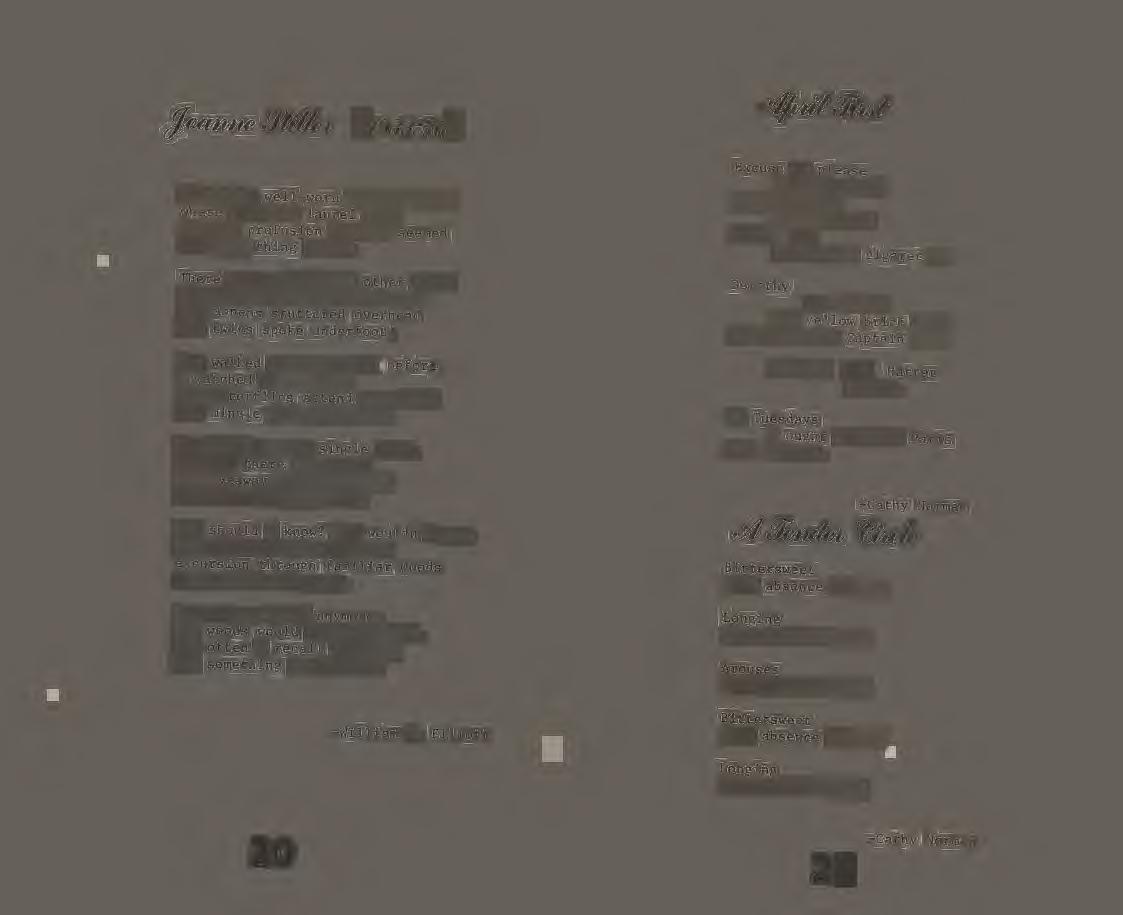
A-Cathy Norman
ffendei
Bittersweet (the absence of you)
Longing (the touch of you)
Arouses (the taste of you)
Bittersweet (the absence of you)
Longing (the tou~h of you)
-Cathy Norman

a healthy paunch bulging like an overstuffed pillow is alarming like a rtug at the door in the middle of sexual intercourse diverting one's attention to other things helps watching the cobwebs hang from your ceiling helps & I think of all the people in the world: the seasoned veterans the 2 bit whores & rowdy punks the crippled & diseased all of us jammed together like gum in a gumball machine waiting to see who will fall next of course there are other things more pleasant i suppose: a perfumed bubble bath pink candles with lavender flame & those occasional thighs that open &slide like snakes but i'm losing my convictions diligence is like striking for higher wages when there aren't any funds the weight here & elsewhere is getting heavier & nothing makes sense anymore but perhaps there is still a little time left to lounge sway be complacent & act dumb before you have to phone your sis in Seattle & ask for help.
Ronald Edward Kittell
Just a fraction of the action Yer a street level diplomat, The weirdo on the corner By the coin-op laundramat.
Concrete lullabies
By jumping from a building
One thousand ninety feet Of paranoid delight.
An urge for a surge A worn out funeral dirge. A symphony of silent thoughts That defy the words.
S.crawled on the wall Of the third stall from the right In the basement barroom shitter Under "Barney's Sheer Delight."
It's just a bar without a dancer, But five bucks can set you fcee. In the backroom of a diner On highway twenty-three.
Cement lullabies with PermaneTit conclusions •• You knew before you started That the rush would set you free.
Concrete lullabies
By jumping from a building
One thousand ninety feet Of paranoid delight.

Henry C. Mason


